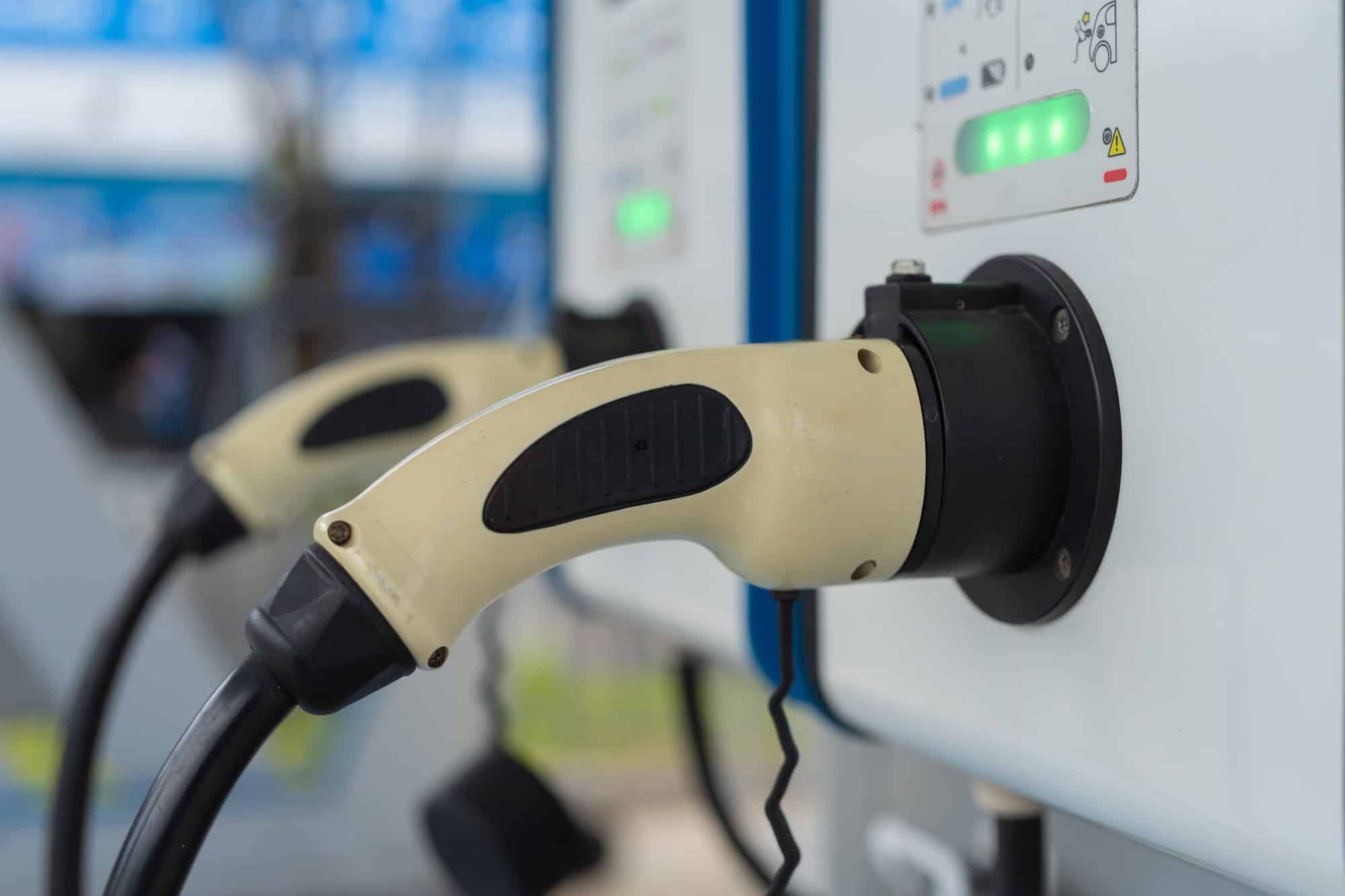Electric vehicles (EVs) play an increasingly important role in the transportation sector to curb greenhouse gas emissions. Policymakers in most U.S. states encourage EV adoption, and since 2010, the federal government has provided a tax credit for purchasing EV chargers for your business. As of August 16, 2022, new rules include a "final assembly in North America" requirement, limiting tax eligibility for specific brands.
The U.S. government also incentivized the purchase and installation of EV charging stations to promote the consistent availability of charging stations throughout the country. Unfortunately, the Alternative Fuel Infrastructure Tax Credit expired at the end of 2021, but the U.S. Department of Energy lists other federal incentives for alternate fuel. States and public utility companies also provide EV charger tax incentives as rebates, grants, and credits.

Why Your Business May Want to Install EV Charging Stations
For commercial establishments, installing EV charging stations represents an exciting opportunity. Whether you are looking for a new amenity to offer tenants, are planning on transitioning your current car fleet to electric vehicles, or just looking for a way to make your property a bit more “green,” you’ve probably considered installing charging stations.
However, something you may not have considered is the tax incentives you can reap just by installing EV chargers. In fact, many property owners are surprised to learn about the Federal, State, and even local tax incentives available to them just for installing new EV chargers. Just keep in mind that while there may be tax incentives for EV charger installation today, they won’t be around forever, so it’s important to act soon to take advantage of the savings.
How Much Does It Cost to Install Commercial EV Chargers?
The costs associated with purchasing and installing commercial EV chargers will depend largely on the charging stations you install. Stations have three power levels, with the lower-powered ones being more affordable.
Lower-level stations draw AC power from the grid before converting it to DC power, which is what electric car batteries need to charge. This conversion is the main reason AC-based chargers are much slower than higher-level DC chargers.
Your choice of charging station will depend upon your business’s current and future needs. Lower-powered chargers take longer to charge an electric vehicle fully, but they may be a good option if you want to install stations for employees whose cars sit at work all day. However, if you have a heavy-duty fleet of vehicles needing charging, faster stations may be worth the additional costs.
Remember that the hardware cost is only a portion of the cost of installing EV chargers. You’ll also need to consider:
- Infrastructure: Some commercial Level 2 chargers and all Level 3 stations require dedicated infrastructure to provide electricity at the proper voltage and power. This infrastructure includes a high-amp circuit breaker, wiring, a power protection system, feeders and cable poles, and labor for the installation.
- Soft costs: Commercial EV chargers require operating permits, contributing to the installation cost. Other soft costs include parking ports, logs, signs and signals, and protective covers for the parking ports.
- Software: Utilities require that all commercial stations have network subscriptions and net metering system software that provides monitoring, protection, and analysis of the entire charging network. While not a huge cost — typically $300 per year — it’s a cost that you pay for the lifespan of the charging network.
- Power management: While not strictly necessary, making your charging stations “smart” by adding particular hardware and software components can reduce long-term operational costs. Smart EV chargers are more efficient, experience less power loss, and may charge faster than their non-smart counterparts.
Level 1
Level 1 chargers commonly serve as home EV charging stations and are not optimal as commercial EV charging stations due to their slow charging speed. These stations plug directly into a wall socket and only pull 120V and output around 2kW, making them great for home use but usually insufficient for commercial applications.
Level 1 chargers cost $300 to $1,500 per charger, excluding installation, infrastructure, and software costs.
Level 2
Level 2 chargers also draw AC current from the grid but use 240V, producing a power rate between 3kW and 20kW. Units become more expensive as their power rate increases. Level 2 chargers are the most common type of commercial charger, and you can find them at most public charging stations.
The price of a Level 2 charger varies between $400 and $6,500 per unit, depending on the power rate and manufacturer.
Level 3
Level 3, or DC fast-charging, stations have the fastest charging rate but come with higher unit and infrastructure costs. They require dedicated electrical infrastructure because they provide up to 600V and feature a power rate of 25kW to 60kW.
These units cost between $10,000 to $40,000 before installation, infrastructure, and permit costs.
Why Your Building Needs Electric Chargers
Installing and maintaining EV charging stations incurs upfront and ongoing operational costs, so it’s important to consider whether the benefits will be worth the effort and expense. Apart from the environmental benefits, there are several benefits to installing EV stations in your building.
Puts Your Business on the Map
One of the most significant barriers to EV adoption has been the development of the surrounding infrastructure. Many people worry about running out of power while out of range from a charging station as their main reason for not buying an EV. However, this concern has led to a massive opportunity for businesses looking to put themselves on the map without paying for ad space.
Google Maps and proprietary apps like Blink Maps show EV drivers the locations of charging stations in their vicinity while helping them plot the most efficient route to a recharging point. When you add your charging stations to a network, you’ll become visible on these apps, providing your business with free advertising, brand promotion, and visibility.
If you’re a B2C business, you’ll appreciate the increase in consumers who will have to spend at least half an hour in your location, giving them plenty of time to browse stores in the area.
You don’t have to rely solely on Google Maps — many EV networks and software developers have launched their own exclusive apps that show EV users the location of nearby charging stations. Putting your business on all these apps increases your chances of attracting drivers to your area, making it worthwhile to become familiar with the top apps drivers use.
EV Charging Apps
Market research may also ensure that you choose the right apps to target. For example, if no one in your area uses Blink Charging or its app, it may not be worth connecting to the Blink network. Major apps include:
Plug Share is a global app that shows the location of charging stations worldwide. In addition to site, the app also provides helpful information about the plug type and various things to do in the area.
Open Charge Map provides users with the addresses of local charging stations, their distance, business contact details, and the number of available charging ports. Unlike similar apps, Open Charge Map does not allow users to leave reviews and comments about their experience at a business or commercial charging station.
Charge Hub has a smaller user base primarily located in the United States and Canada. In addition to providing users with the locations of nearby charging stations, the app also helps drivers buy useful accessories to speed up charging at home and commercial stations.
Builds Customer Loyalty
Due to the limited range of many EV cars, EV drivers quickly learn about convenient charging stations in their area. By becoming a primary charging destination, you can encourage drivers to visit your location.
Most drivers prefer the convenience of doing multiple things in one location, and many will quickly pop in to take care of chores while waiting for their EV to charge. This repeated cycle of charging and buying will create a strong brand association for your business and build up true, long-lasting customer loyalty.
Builds a Base for Related Businesses
EV drivers tend to be interested in clean technology. According to a 2017 CleanTechnica survey, up to 40% of EV drivers also have home solar systems and are more willing to consider environmentally friendly products and services. The increased visibility of being a commercial charging station can lure prospective customers to your office, especially if you sell “green” products or services.
Most EV drivers will develop routes around charging stations, generating more sales opportunities for your business. You’ll also create a strong brand association in their mind, making them more likely to buy your product than from other companies.
Provides a Second Source of Revenue
While the upfront costs of purchasing and installing EV charging stations are rather hefty, operational costs are relatively low. With a little extra effort, you can offer your charging stations for commercial use and be a perk for employees, opening up a relatively hassle-free revenue stream.
If you decide to charge customers or visitors, you’ll need to invest in a smart charging solution with access control. If you already rent out a parking lot or garage, you can streamline the exit process by allowing EV drivers to pay for their charging station and parking time simultaneously.
Possible EV Charger Commercial Public Utility Rebates
While states and federal incentives have been the main driver of EV adoption, private companies have also started offering rebates and other incentives to encourage people to use alternative fuel sources.
Most commercial public utilities understand the growing desire for clean power and have started offering rebates on commercial charging stations. In most cases, the charging stations need EVSE capability to connect to the utility’s network, allowing the utility to control demand on the network and integrate renewable power sources into the grid.
Some utility providers offer generous rebates and incentives, sometimes between 50% and 100% of the initial purchase and installation and any associated infrastructure development. Utilities tend to prioritize installations in low-income or multi-family communities and offer better funding. However, even unprioritized commercial buildings generally receive back at least 50% of their initial cost.
California businesses have the luxury of having some of the most generous rebates in the country. Anaheim Public Utilities provides up to $5,000 back for Level 2 stations or up to $10,000 per Level 3 charger. The Edison’s Charge Ready program can cover up to 100% of costs, especially if you’re in a disadvantaged area or placing charging stations in important community locations, such as multi-family residential units.
Contact your local utility and its competitors first if you’re considering EV charging stations. You may find that your commercial rebates can cover your initial outlay while providing long-term incentives to make the installation more profitable for your business.
What Was the Federal Electric Vehicle Charger Tax Credit?
Until the end of December 2021, the federal government offered the Alternative Fuel Infrastructure Tax Credit to anyone installing an EV charger. Commercial entities that installed fueling equipment for non-petroleum fuels such as liquified hydrogen, biodiesel, and electricity could receive up to 30% of the installation cost as a tax credit, with a limit of $30,000. Businesses could also use any unclaimed credit as a general business tax credit that they could carry backward one year or forward 20 years.
While the federal tax credit is no longer available, individual states offer several EV charger tax incentives that can drastically lower the installation cost.
State Incentives for Commercial EV Chargers
While California tends to lead the pack in terms of EV charger tax incentives, most states offer either tax credits or rebates to any commercial enterprises installing EV chargers in their location. Currently, the only states that don’t offer incentives for electric vehicles are Alaska, Kansas, Kentucky, North Dakota, South Dakota, and West Virginia.
As states can offer their own version of incentives, it’s essential to understand the nuances of your state’s and local municipalities’ initiatives. Many have different qualification criteria that vary drastically. Some examples:
Florida
Sarasota County is Florida’s leading proponent of EVs and has supported their adoption with resolutions and education programs since 2005. It was also the first local government in Florida to add electric vehicles to its fleet.
The county has a ChargeUP! Rebate program that refunds non-profits or government organizations 50% of their EV installation costs (up to $4,000) or businesses 25% of their cost, up to a maximum of $2,000.
Georgia
Georgia has several incentives for clean energy and electric vehicles, including a tax credit for commercial charging stations. Georgia’s EV charging station tax credit allows any eligible business to receive 10% of the purchase and installation cost of a publicly-available charging station within Georgia, up to $2,500. It’s unclear whether you can apply for this credit multiple times if you’re installing several stations or if it’s a one-time credit.
Tennessee
The Tennessee Department of Environment and Conservation has partnered with the Tennessee Valley Authority to develop a state-wide fast electric-charging network along the interstates and major highways. The plan is to have charging stations every 50 miles on the state’s road infrastructure, focusing on currently underserved areas and the busiest transportation corridor throughout the state.
The Fast-Charge TN Network will provide eligible projects with up to 80% of the costs to purchase, install, operate, and maintain charging stations within the prioritized corridor. The electric vehicle incentive only applies to DC charging stations, requiring two to four chargers at every location, and limits costs to $150,000 per fast charger.
Unfortunately, the first round of funding closed on October 15, 2021, but the state will offer additional funding rounds in the future. If your business qualifies, it may allow you to put in high-quality, fast Level 3 chargers at minimal cost to your business.
Commonly Asked Questions About EV Charger Rebates and Incentives
What Is EVSE? Is it Different from a Charging Station?
EVSE, or Electric Vehicle Supply Equipment, is a security protocol that allows for two-way communication between the charger and the vehicle. At its most basic level, this protocol ensures correct charging by regulating the current according to the maximum current the station can supply and the maximum current the vehicle can accept. EVSE protocols can also prevent current from flowing under certain conditions, such as improperly inserted cables, hardware faults, and broken cables.
While it’s still possible to buy charging stations that don’t follow the EVSE protocol, the convenience and features that EVSE provides make it an appealing option for most commercial charging station owners. EVSEs are also usually a requirement to qualify for EV charger tax incentives. Public utilities will use EVSE to add the station to their network, allowing them to monitor and control the power flow to the station.
Do You Need a Minimum of Charging Stations to Qualify?
Most EV charger tax incentives don’t have minimums or maximums. The Tennessee Fast-Charge TN Network does require at least two DC charging stations, but most other states offer incentives per charging station. In many cases, you can apply for these incentives regardless of how many stations you want to install.
What If My Business Already Has Charging Stations?
Depending on your particular state, you may still be able to claim a retroactive tax credit or rebate on your installation. Public utilities will often require businesses to apply for the rebate before incurring any eligible costs, meaning that any money you spent before your application won’t qualify. However, it’s always worthwhile to research if your state and public utilities offer retroactive incentives.
It’s also important to remember that most incentives, especially rebates with a fixed budget, work on a “first-come, first-serve” basis. When the funding runs out, you won’t be able to qualify, regardless of whether or not you meet the eligibility criteria.
What Is the Difference Between a Tax Credit and a Rebate?
While both incentives will reduce the cost of your original EV charger installation, they do so in different ways. States and federal bodies prefer tax credits, while public utilities will provide rebates.
Tax credits are a credit toward your yearly tax return; while you won’t get money back in your pocket, you will pay less during tax season. Some states allow businesses to use their business tax credits retroactively for the past year or hold onto the credits for 20 years. Consult your accountant or tax professional to find out how best to leverage these credits for your business.
Rebates work by having the organization offer the rebate to pay you back directly. They’re typically a much faster way to get your money back than tax credits. Depending on the utility, rebates can even completely cover the cost of installation, which lets you reap the benefits of having commercial EV charging stations sooner and with little to no upfront cost.
Contact Us Today To Learn More About Electrical Vehicle Charger Installation
If you own or operate a “customer-facing” property such as an apartment building, office building, shopping mall, or retail center, installing new electrical vehicle chargers in your parking lot is basically a no-brainer. Not only will you receive tax incentives and create a more positive sentiment among your existing tenants and patrons, but you can also attract new patrons by advertising free EV charging as an amenity.
We have installed electric vehicle chargers in apartment buildings, condos, shopping centers, and a wide range of other locations throughout Florida. Our team has the experience and expertise necessary to assess your location, design your EV charger configuration, and facilitate the installation from start to finish. We can even help you vet different EV charger options to find the one that works best for your location and your budget.
If you’re interested in taking the next steps in EV charger installation, the best thing to do is give Suncoast Power a call at (754) 200-5872 to speak to a member of our team. We’d be happy to talk through your options with you and even schedule an on-site assessment.


